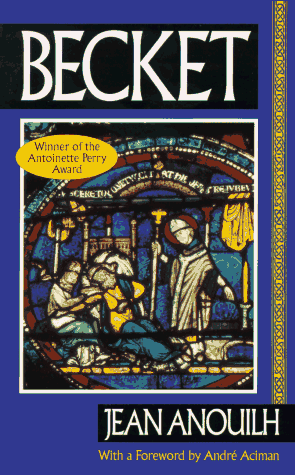
Happy Thanks -giving! I am thankful to be over the flu and back online. But while I was sick I managed to finish some reading, including Becket by Jean Anouilh.
I have to confess, in my freshman history class, I had trouble keeping Thomas Becket separate from Thomas More. Both Thomases opposed powerful Henrys (the II and the VIII) and were killed for holding certain ideas of the Church above the king. And I'm not the only one to see a connection.
I particularly appreciated Stephen Greydanus' remark, "In a way the 12th-century events of Becket, which is the earlier story (and also the earlier play, and the earlier film), play as a kind of dress rehearsal for the more momentous 16th-century events related in A Man for All Seasons." The whole time I was reading the play, I kept thinking, "This line is so familiar. I've seen this. No, wait... that was A Man for All Seasons." Now I don't feel so silly.
Anouilh admits that his play is not always historically accurate (particularly in it's portrayal of Becket as a Saxon), and as I was reading, I found myself thinking, "Really? People were that primitive back then?" But it's not the actions, or even the attitudes, of the characters that I had trouble believing. Instead, it's the convenient simplicity of his dialogue that throws me. Anouilh says in his preface that he is not a "serious" person, and his dialogue has a witty, light touch, but this somehow makes it too heavy-handed when revealing who the unenlightened, selfish characters are (i.e. all the Normans). Also, Becket's motives for refusing the king seem petty, or even self-serving, at times, but Anouilh doesn't question them.
Not that I would be overly embarrassed if I had written Becket. Anouilh's play is still an enjoyable and powerfully concise treatment of honor, religion, and politics. I'll have more to say about it once I've read T.S. Eliot's Murder in the Cathedral.
Side note: Henry VIII may not have missed possible connections between Thomas Becket (d. 1170) and Thomas More (d. 1535) either because in 1538 he ordered Thomas Becket's shrine destroyed and all references to his murder and sainthood erased. This was only after the long-dead saint refused to show up at a trial to explain why he wasn't a traitor.
I watched the film this semester, wasn't that impressed, and talked with one of my friends about it over thanksgiving, who mentioned most of what you said in this post. The most interesting thing I learned was that Becket was Chaucer's 'hooly martyr for to seeke' in the preamble of his Tales of Caunterbury.
ReplyDelete